The Secret to Perfect Garlic-Lemon Seafood: Boost Flavor and Enhance Your Dishes
Garlic and lemon—a timeless combination that transforms ordinary seafood into extraordinary dishes. Whether you’re preparing shrimp, salmon, or scallops, the zesty acidity of lemon juice perfectly complements the rich, aromatic qualities of garlic, creating a flavor profile that’s both vibrant and versatile. In this article, we’ll explore the culinary magic of garlic-lemon seafood, delving into how lemon juice interacts with different types of fish, the ingredients that make up a perfect lemon garlic sauce, and the optimal ways to incorporate this flavorful duo into your meals. From enhancing texture to adding depth, the synergy between garlic and lemon is a secret weapon for any seafood enthusiast. Join us as we uncover the science behind this classic pairing and discover creative recipes that showcase its versatility.
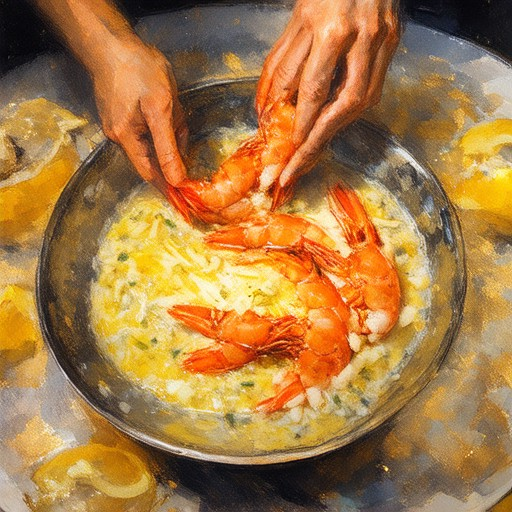
What Does Lemon Juice Do to Seafood?
Lemon juice plays a multifaceted role in enhancing the experience of consuming seafood. Its primary function is to introduce acidity, which balances the inherent briny and sometimes metallic flavors of seafood, creating a harmonious taste profile. The citric acid in lemon juice acts as a natural enhancer, brightening the dish and complementing the richness of the seafood.
Additionally, lemon juice may aid in enzymatic processes, potentially breaking down proteins and fats, making the meal easier to digest. This enzymatic action can tenderize the flesh, especially in richer varieties like salmon, enhancing the overall eating experience.
Culinary applications extend beyond flavor enhancement; chefs utilize lemon juice for its ability to lift and brighten dishes, counteracting any off-flavors that may arise from the seafood. The use of lemon juice is traditional in various cuisines, reflecting its versatility and effectiveness across different culinary traditions.
While the exact impact of lemon juice on digestion requires further study, its use is widely recommended for its potential health benefits, including the vitamin C content, which supports immune function. The application of lemon juice can vary based on the type of seafood, with adjustments made to achieve the desired flavor balance.
In summary, lemon juice serves as an acidic marinade, enhancing flavor, potentially aiding digestion, and contributing to the overall enjoyment of seafood dishes.
What is Lemon Garlic Sauce Made Of?
Lemon garlic sauce is a versatile condiment typically made from a combination of fresh lemon juice, minced garlic, olive oil, and a few seasonings. Here’s a breakdown of its core ingredients:
- Lemon Juice : Provides a bright, acidic flavor.
- Garlic : Adds a sharp, aromatic note.
- Olive Oil : Serves as a base to emulsify the sauce or carry flavors.
- Salt : Enhances overall taste.
- Red Pepper Flakes : Optionally adds heat.
- Black Pepper : Offers a subtle kick.
- Parsley : Common herb for freshness.
- Optional Additions : Sugar or honey to balance acidity, butter for richness, capers for brininess, and parmesan cheese for depth.
This sauce is highly customizable, often used as a marinade, dipping sauce, or finishing drizzle for grilled meats, pasta, or vegetables.
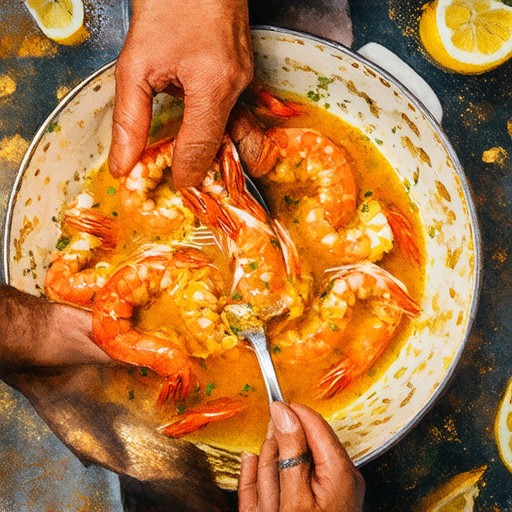
When to Add Lemon to Shrimp: Before or After Cooking?
When preparing shrimp, the timing of when to introduce lemon zest and juice is crucial to maintain optimal texture and flavor. Here’s a structured approach:
- Before Cooking: While some recipes suggest marinating shrimp in lemon juice to enhance flavor, this should be done cautiously. A short marinate (10-15 minutes) is acceptable, but longer periods may lead to texture breakdown due to acid denaturation.
- After Cooking: The recommended method is to add lemon zest and juice after the shrimp are cooked. This approach preserves the shrimp’s texture and allows the lemon flavor to meld with other ingredients without overpowering the dish.
By adding lemon zest and juice post-cooking, you ensure a brighter, more balanced flavor profile, complementing the shrimp’s natural taste and preventing overpowering acidity. This method also facilitates the creation of a tangy sauce by deglazing the pan, enhancing the overall dish’s complexity.
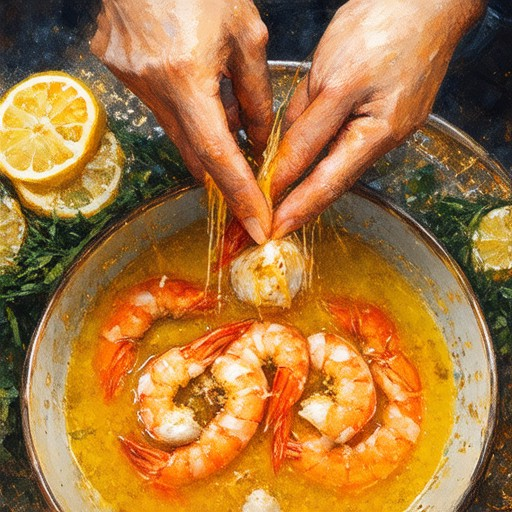
Are Shrimp and Lemon Good Together?
Shrimp and lemon are indeed a fantastic pairing! The bright acidity of lemon complements the mild flavor of shrimp beautifully, creating a harmonious balance between tanginess and seafood freshness. Here’s why they work so well together:
-
Tenderizing Effect : The acid in lemon juice helps break down proteins in shrimp, resulting in a softer, more tender texture. This prevents the shrimp from becoming rubbery when overcooked.
-
Flavor Enhancement : Lemon adds a refreshing brightness to dishes, enhancing the natural flavor of shrimp. It works particularly well in marinades, sauces, or as a finishing touch with a squeeze of lemon juice or a sprinkle of lemon zest.
-
Herb Complements : Lemon pairs exceptionally well with a variety of herbs and spices. Herbs like dill, parsley, thyme, and rosemary can be combined with lemon for a vibrant, aromatic dish.
-
Versatile Usage : Lemon can be used in numerous ways – as a marinade, in sauces, or simply as a garnish. For example, lemon garlic butter is a delightful addition to grilled shrimp, while lemon zest adds a smooth finish to baked dishes.
-
Serving Suggestions : Consider serving shrimp with lemon wedges on the side, allowing individuals to adjust the acidity to their preference. Lemon-based dipping sauces or aiolis are also excellent choices for shrimp skewers or tacos.
-
Cultural Context : Traditionally, lemon is widely used in Mediterranean and Middle Eastern cuisines with seafood, offering a tangy note that enhances the dish’s complexity.
In summary, shrimp and lemon are a versatile and delicious combination, suitable for a range of cooking methods and flavor preferences.
What Should Not Be Mixed with Lemon?
Lemon is a versatile ingredient used in many recipes, but there are certain foods and ingredients that should not be paired together due to chemical reactions or flavor clashing. Here are some common items to avoid mixing with lemon:
- Foods with High Acid Content: Tomatoes, mangoes, and other acidic fruits. The combination of lemon and tomatoes can create an overly acidic taste, while mangoes share a similar level of acidity.
- Dairy Products: Milk, cheese, and yogurt. Lemon’s acidity can react with dairy proteins, causing curdling or a unpleasant texture.
- Spicy Dishes: Extremely spicy dishes may become overly sharp and tangy when combined with lemon, overpowering the flavor of the dish.
- Red Wine: Lemon can interfere with the flavor of red wine, making it taste bitter or harsh due to its high acidity.
- Onions: Onions contain sulfur compounds that can turn gaseous when digested. Pairing them with lemon might exacerbate this effect.
- Cilantro: The strong flavor of cilantro can be amplified by lemon, potentially overwhelming the dish.
- Oregano and Thyme: These strong herbs may become too dominant when combined with lemon, affecting the overall taste of the dish.

What Does Soaking Shrimp in Lemon Juice Do?
Soaking shrimp in lemon juice can have several beneficial effects on the shrimp and your dish. Here’s a breakdown of what happens:
- Marinates the Shrimp:** Lemon juice acts as a natural marinade, infusing flavor and tenderizing the shrimp.
- Kills Pathogens:** The acidic properties of lemon juice help kill harmful bacteria and microorganisms commonly found in raw seafood.
- Changes Texture:** The citric acid in lemon juice can slightly cook the shrimp, resulting in an opaque, cooked appearance and a firmer texture.
- Enhances Flavor:** Lemon juice adds a bright, tangy flavor to the shrimp, complementing perfectly with herbs and spices in your recipe.
- Prevents Overcooking:** By partially cooking the shrimp through marinating, you can control the cooking process, preventing them from becoming rubbery or overcooked when grilled or sautéed.
For best results, soak shrimp in fresh lemon juice for about 15-20 minutes before cooking. This time ensures the shrimp are evenly marinated without overdoing it.
Looking for more seafood inspiration? Check out Real Seafood Market for premium shrimp and seafood recipes!
Conclusion: Soaking shrimp in lemon juice is a simple yet effective technique that enhances both taste and safety, making your dishes more flavorful and enjoyable.

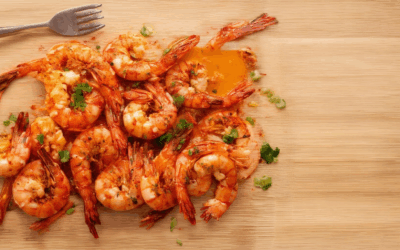
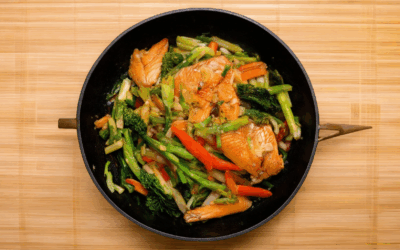
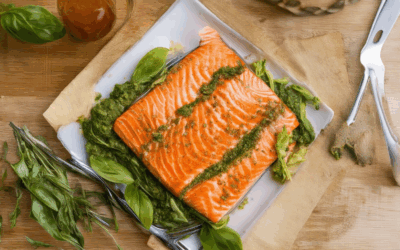
0 Comments